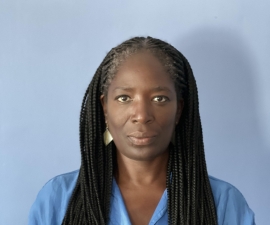

Research Bio
Fumi Okiji arrived at the academy by way of the London jazz scene in which she took an active part as a vocalist and improvisor.
Okiji works across black study, critical theory, and sound and music studies. Her research and teaching looks to black expression for ways to understand modern and contemporary life, which is to say, she explores works and practices for what they can provide by way of social theory. Her book Jazz as Critique: Adorno and Black Expression Revisited (Stanford University Press, 2018) is a sustained engagement with Theodor Adorno’s and the critical potential of art. She proposes that the socio-musical play of jazz is not representative of the individualistic and democratic values the music is most readily associated with. The book centers blackness as a more appropriate analytic through which to understand its social significance.
Deepening the engagement established in her first book, her forthcoming Billie’s Bent Elbow: Exorbitance, Intimacy and a Nonsensuous Standard (Stanford University Press) considers black life as a mode of living with a markedly distinct relationship to contradiction, disorder and fantastic possibility. In augmentation of conversations taking place in black theory—and drawing from Adorno and Walter Benjamin on aesthetics, music, dialectics, mimesis, as well as Yorùbá aesthetics—the work explores the modal anomaly of black life, and its subjunctive comportment. Music from Cecil Taylor, Don Cherry, Nina Simone, among others, not so much provide example as a further avenue of theoretical resource.
Research Expertise and Interest
Black study, Frankfurt School Critical Theory, sound and music studies, aesthetics
